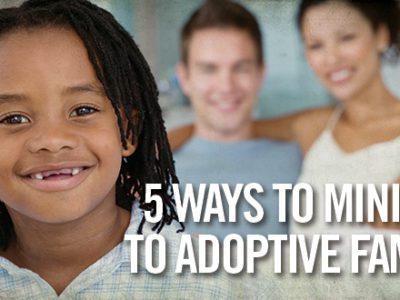 I believe adoption is near to the heart of God and is one of the most beautiful pictures of the salvation the Bible offers. Ephesians 1:5 says that all believers are adopted children of the Father. “He predestined us to be adopted through Jesus Christ for Himself, according to His favor and will” (HCSB). Moses was adopted by Pharaoh’s daughter (Exodus 2:10); Esther was adopted by her cousin Mordecai (Esther 2:7); even Jesus was “adopted” and raised by Joseph. God has given His heart for adoption to many of His people.
I believe adoption is near to the heart of God and is one of the most beautiful pictures of the salvation the Bible offers. Ephesians 1:5 says that all believers are adopted children of the Father. “He predestined us to be adopted through Jesus Christ for Himself, according to His favor and will” (HCSB). Moses was adopted by Pharaoh’s daughter (Exodus 2:10); Esther was adopted by her cousin Mordecai (Esther 2:7); even Jesus was “adopted” and raised by Joseph. God has given His heart for adoption to many of His people.
A little over four years ago, my wife and I arrived home from Ethiopia with our two newly adopted sons, ages four and almost two at the time. Through our adoption process our family has changed in many ways. Obviously, we look different, but more importantly, we have come to see differently. We have a new awareness as insiders in the adoption community. We have seen a large adoption movement in our area. Even in our small town we have a church with 10 or more families who have adopted internationally, and there are many more in our region. Praise God for these wonderful families!
I hope you have seen a rise in adoptive families in your church as well. While all families — adoptive, foster, blended or otherwise — have unseen struggles, there are some unique challenges that kids who have been adopted and their families face that many kidmin teachers and volunteers may not be aware of.
Here are a handful of helpful considerations from an adoptive dad to help you minister more effectively to these amazing children and their forever families.
1. Be attachment aware.
Attachment theory describes the type and quality of connection between people in relationships and is defined in varying levels of security and insecurity. One of the key concepts in attachment theory is that a child must develop a strong emotional connection with at least one primary caregiver in order to achieve healthy emotional development. This typically begins at infancy. In the case of most kids who have been adopted, this attachment has been broken.
Inherently, adoptive families must work hard to reestablish secure attachment for and with their adoptive children as they seek to rebuild trust and redefine their understanding of family. Much of this has to do with the child learning to relate to members within the immediate family differently than non-family members and strangers. One way you can help your adoptive families with their attachment is by limiting the type of physical contact you make. High fives and quick pats on the back are fine, but be careful to help reinforce appropriate social boundaries. Hugs, cuddles and lap-sitting are only for mom and dad. In this day and age this is a good rule of thumb for all children to whom we relate in ministry, not just children of adoption, but it is especially important for adoptive families as they work to build familial attachment.
2. Watch your language.
Because we adopted internationally, we had the added complication of language learning with our four year old. English is his third, yes third, language. Although he is a very bright boy, and tracked fairly well with a conversation after only a few months, we learned quickly that he had a difficult time understanding many of the figures of speech that Americans use, and that he took statements very literally.
If a teacher asked him to “run” the attendance sheet to another classroom across the hall, he would literally run. Well-meaning people said things like, “He’s so cute, I could just eat him,” or, “I’m going to steal you! Do you want to come home to live with me?” While they intended to be cute and complementary, these kinds of statements caused our young son to be terrified and confused.
For what it’s worth, any reference to stealing an adoptive child, or joke about taking them to live with you should be completely off-limits. The biggest fear within many adopted kids is that their new family might one day abandon them. They need to know with complete confidence that their families are “forever.” Do not assume that they understand this, and please do take every opportunity to help reinforce their security within their family. So, tune in to how you phrase things when interacting with English learners. A lot of what you say may be lost in translation.
3. Get rid of “real.”
While we are talking about talking, it is important to have a basic understanding of some terminology to use or avoid. Probably the biggest faux pas is the use of the word “real” in regard to family relationships. For instance, “How do your real kids feel about their new brothers?” “What happened to their real mom?” or in our case, since we adopted two boys at once, “Are they real brothers?”
First of all, these kinds of questions are personal and private. We’ll talk about respecting kids’ stories next. For now, lets pick on this word “real.” To be clear, adoptive families are real families. My boys are real kids. My daughters by birth are the real sisters of my Ethiopian sons. I am my boys’ real dad. My wife is their real mom. We feed them, clothe them, do their homework with them, pick them up when they fall down, kiss their owies and snuggle them into bed at night. It is all very real. Adoptive families are very aware when the “real” word is used, and leaders in kids ministry should be aware that many find it offensive. It is more acceptable to use the terms “birth mother” and “birth family.” We are simply our kids’ mom, dad, brother or sister.
4. Kids’ stories are private.
Every one of us has a story. You have yours, and I have mine. Not all of our stories are pretty, and many parts of our stories are personal and private, so we don’t typically share all of the intimate details of our lives with everyone we meet. Most of the time, most people respect this unwritten rule and don’t ask each other probing personal questions. However, people don’t seem to be as reserved when it comes to asking for details about children who have been adopted.
This happens regularly at church, on the playground, even at the grocery store. I believe that people are genuinely curious and not purposefully prying when they ask questions like, “Why were they put up for adoption?” or “What happened to their family?” Most adoptive parents will politely re-direct the conversation without answering these awkward questions because our kids’ stories are their stories. They have histories that they need the freedom to ponder, process, and present on their own terms when they are ready. Asking such questions of or about kids who have been adopted is often seen as an inappropriate invasion of their privacy.
5. Be sensitive to missing pieces.
One common part of many adoption stories is the fact that families may not know much of their kids’ stories. Particularly with older children and international adoptions, there may be many missing pieces. Our child may not have a baby picture to bring in to class, may have no idea what physical traits a birth parent possessed, and may not have any knowledge about their family’s history or heritage. Be sensitive to these missing pieces as you plan discussions and activities for your class.
Not everyone is called to adopt, but we can all support and serve children who have been adopted and their forever families by ministering to them from a thoughtful and informed perspective.
Chuck Peters is Manager of Marketing & Media Production for Lifeway Kids. A graduate of Columbia Bible College, Chuck, and his wife, Cris, have served vocationally & voluntarily in Student and Children’s Ministry for many years. They have four amazing children.


 Leading, Learning, Dreaming, and Growing
Leading, Learning, Dreaming, and Growing »
»
Leave a Reply